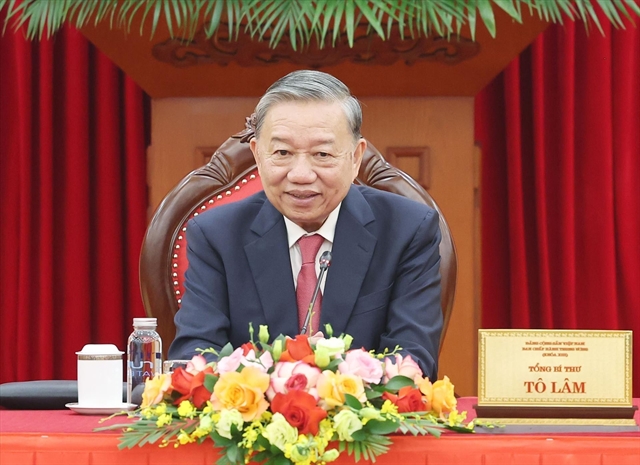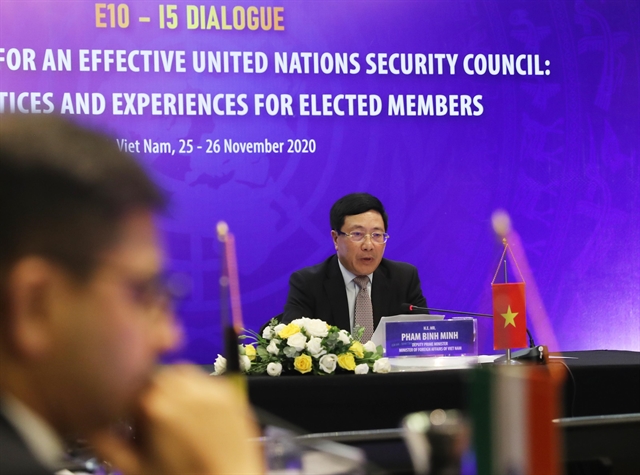 Politics & Law
Politics & Law


|
| Vietnamese Deputy Prime Minister and Foreign Minister Phạm Bình Minh addressed the E10-I5 dialogue late Wednesday from Hà Nội. — VNA/VNS Photo Lâm Khánh |
HÀ NỘI — Vietnamese Deputy Prime Minister and Foreign Minister Phạm Bình Minh urged the 10 non-permanent members of the UN Security Council to work closer together to help the Council be more effective in “addressing ever greater challenges to international peace and security.”
He made the statement as he was addressing a meeting drawing representatives from the 10 current non-permanent members (E10) – including Việt Nam – and the five newly-elected non-permanent members (I5) of the UN Security Council late Wednesday to share experience in UNSC activities.
The meeting, held both in-person and virtually, was the first international event presided over by Việt Nam during its current term on the Council.
Minh believed that since its term on the Council more than 10 years ago, “E10 members have been cooperating better, have more substantive roles to play, and show more determination in advocating for more equal distribution of work with the permanent members.”
He said “cooperation does not mean we must always have the same agenda, share the same views or act the same way,” but as a diverse group of countries with different interests and priorities, “cooperation among E10 members is, more importantly, about having the readiness to work together to achieve the best available solution even in issues where we differ.”
He said he strongly believes that with India, Ireland, Kenya, Mexico and Norway joining the Council in 2021, the E10 will continue to build on this momentum.
“Though an elected member’s tenure is fixed to a short two-year-period, by working together, E10 members can assist each other to not only make best use of it but also enhancing the continuity of the efforts spent, and the legacy of our work can transcend far beyond this limit,” he said.
Minh noted that in 2020, the advent of the COVID-19 pandemic which resulted in not only a health crisis but also a social and economic one has led to “serious implications on international peace and security,” while rising geopolitical tensions among major powers, the outbreak of new conflicts and complex developments of ongoing and dormant crises across regions flare up.
Serious non-traditional security threats, from climate change and environmental degradation to terrorism and transnational organised crimes, and faltering commitment to multilateral institutions plus increasingly visible “manifestations of excessive nationalism” all make it harder for the UN and the Security Council, Minh said.
Given the situation, the international community has made various joint efforts to “sustain peace, promote cooperation and development, and to affirm member states’ belief that multilateralism and the coordinating role of the United Nations are crucial in addressing global challenges,” according to the Vietnamese diplomat, adding that the Security Council has “continued to fulfill its role as the body bearing the primary responsibility in the maintenance of international peace and security.”
He affirmed that as a non-permanent member, Việt Nam has been working closely with Council members to promote dialogue, aiming for the de-escalation of tension and confrontation, and finding fair and reasonable solutions to conflicts and disputes.
“We have worked during and beyond our first Presidency to strengthen global commitment and adherence to the UN Charter and international law. We have joined efforts to promote multilateralism and multilateral solutions to conflicts, with the United Nations as the coordinating centre for these joint efforts and regional organisations playing a more active role,” said the Deputy PM.
The country expects to draw more attention from the Council on conflict prevention, protection of civilians – especially vulnerable groups and civilian infrastructure, and post-conflict recovery and reconstruction, especially mine action.
On the sidelines of the meeting, Deputy Foreign Minister Lê Hoài Trung told the press that he expects the meeting to enable other members of the council to find ways to contribute the voice not only of the continent they represent but of other UN country members that have voted for them.
Another important goal of the meeting is to share measures to push cooperation between the non-permanent members of the council and the five permanent ones with the veto power – the UK, the US, France, China, Russia.
The meeting demonstrated VIệt Nam’s foreign policy of multilateralism and diversification, as well as the country’s responsible and proactive contributions to the common agenda of the Council, along with commitments to regional and global peace and security, Trung emphasised. — VNS